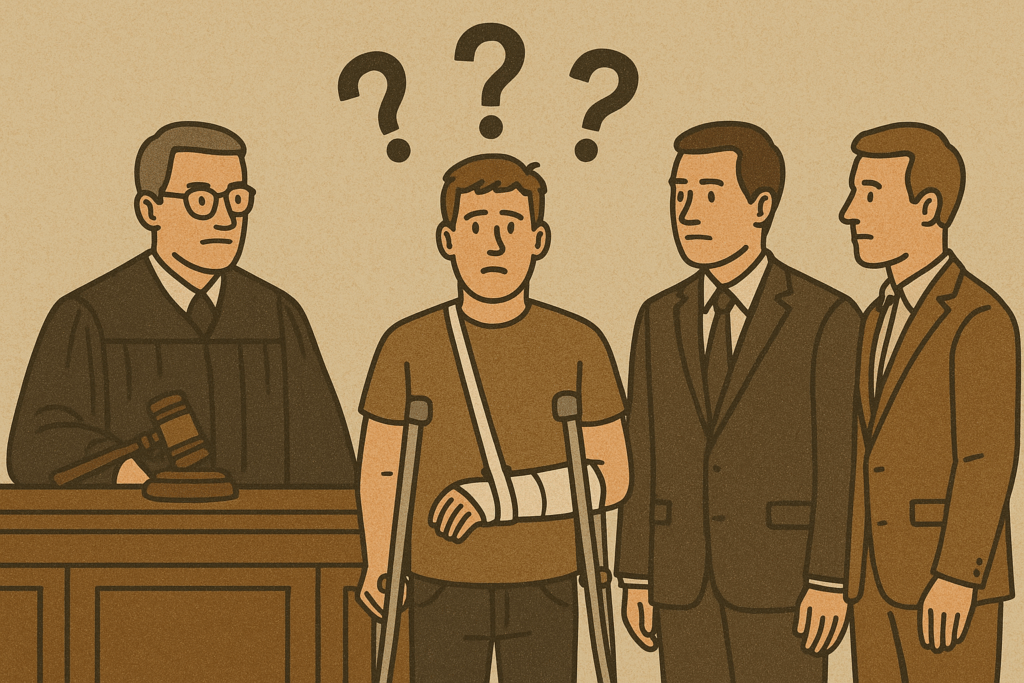When faced with the aftermath of a personal injury, one of the most crucial decisions you will encounter is whether to settle your case or take it to trial. Each approach comes with its own set of advantages and disadvantages, and understanding these can significantly impact your recovery process and financial outcome. This guide will provide a detailed examination of both options, helping you make an informed decision that aligns with your best interests.
Table of Contents

Understanding Personal Injury Cases
Personal injury cases arise when an individual suffers harm due to the negligence or wrongful conduct of another party. These cases can stem from various incidents, including car accidents, slips and falls, medical malpractice, and product liability. The injured party may seek compensation for medical expenses, lost wages, pain and suffering, and other related damages.
The Role of Attorneys in Personal Injury Cases
Having a skilled personal injury attorney can greatly influence the outcome of your case. An experienced lawyer will guide you through the legal process, negotiate with insurance companies, and advocate for your rights. At G.J. Chavez & Associates, P.C., our team is committed to helping you secure the compensation you deserve.
The Settlement Process
A settlement occurs when both parties agree to resolve the case without proceeding to trial. Settlements can happen at any stage of the legal process, from pre-litigation negotiations to after a lawsuit has been filed.
Key Features of Settlements
- Negotiation: Settlements involve negotiation between the injured party (plaintiff) and the party at fault (defendant) or their insurance company. This negotiation can include discussions about the amount of compensation and the terms of the agreement.
- Compensation: In a settlement, the injured party receives a lump sum payment or structured payments in exchange for releasing the defendant from further liability related to the incident.
- Speed: Settlements can often be reached more quickly than going to trial, allowing the injured party to receive compensation sooner.
- Confidentiality: Settlement agreements can include confidentiality clauses, meaning the details of the agreement may not be disclosed publicly.
Advantages of Settlements
- Quicker Resolution: Settlements can be finalized much faster than trials, allowing you to receive compensation in a timely manner.
- Lower Costs: Settling a case can reduce legal costs associated with prolonged litigation, such as court fees, expert witness fees, and attorney expenses.
- Control Over the Outcome: Settlements provide the parties with more control over the final agreement, allowing for negotiations that consider the needs and circumstances of both sides.
- Less Stressful: The litigation process can be emotionally taxing. Settling often reduces the stress and uncertainty that come with a trial.
Disadvantages of Settlements
- Potentially Lower Compensation: While settlements can provide quick compensation, they may not always reflect the full extent of damages. Injured parties may feel pressured to accept lower offers to expedite the process.
- No Precedent: Settlements do not establish legal precedent, which may be important for similar future cases.
- Risk of Undervalued Claims: Without thorough assessment and negotiation, there’s a risk that the claim may be undervalued, especially if the injured party is not fully aware of their rights and entitlements.
The Trial Process
A trial occurs when a personal injury case is brought before a judge or jury for a formal legal proceeding. The trial process is often lengthy and involves presenting evidence, witness testimonies, and legal arguments.
Key Features of Trials
- Legal Proceedings: Trials involve a structured legal process, including jury selection, opening statements, witness examination, and closing arguments.
- Burden of Proof: In a personal injury case, the plaintiff has the burden of proving their case by a preponderance of the evidence, meaning it is more likely than not that the defendant is liable.
- Jury Decision: In jury trials, a group of jurors will deliberate and reach a verdict, determining whether the defendant is liable and the amount of damages awarded.
- Public Record: Trials are public proceedings, meaning the details of the case may be accessible to the public.
Advantages of Trials
- Potential for Higher Compensation: Trials can result in a jury award that may exceed settlement offers, especially in cases involving significant damages and strong evidence.
- Establishing Legal Precedent: Trials can set legal precedents that may influence future cases, particularly in establishing standards of care or liability.
- Full Examination of Evidence: Trials allow for a comprehensive examination of evidence and witness testimonies, providing a fuller picture of the case for the judge or jury.
Disadvantages of Trials
- Lengthy Process: Trials can take a considerable amount of time, with many cases dragging on for months or even years before a resolution is reached.
- Higher Costs: The costs associated with trials can be significant, including attorney fees, court costs, and expenses related to gathering evidence and expert witnesses.
- Uncertainty of Outcome: There is no guarantee of a favorable outcome in a trial, and juries can be unpredictable. The risk of losing the case altogether is a significant concern.
- Emotional Toll: The trial process can be stressful and emotionally draining, as it often involves intense scrutiny and examination of personal circumstances.
Key Considerations When Choosing Between Settlement and Trial
When deciding whether to pursue a settlement or take your personal injury case to trial, several factors should be considered:
1. Nature of the Injury
Evaluate the severity of your injury and the extent of damages. If your case involves significant medical expenses, lost wages, and ongoing treatment, a trial may be more appropriate to seek maximum compensation.
2. Strength of Evidence
Assess the strength of your evidence and legal arguments. If you have compelling evidence supporting your case, you may be more confident in pursuing a trial.
3. Insurance Company Behavior
Consider the tactics and behavior of the insurance company involved. If they are unwilling to negotiate fairly or if they have a history of lowballing settlement offers, a trial may be necessary to seek justice.
4. Time Considerations
Evaluate how quickly you need compensation. If you require funds urgently for medical bills or other expenses, a settlement may provide quicker relief than a lengthy trial process.
5. Emotional Readiness
Consider your emotional readiness for a trial. Trials can be stressful and emotionally challenging, and it’s essential to assess whether you are prepared for the demands of litigation.
6. Legal Guidance
Consult with your personal injury attorney to discuss the potential benefits and drawbacks of each approach. An experienced lawyer can provide personalized guidance based on your situation and help you make an informed decision.
The Role of a Personal Injury Attorney
Whether you choose to settle or go to trial, having an experienced personal injury attorney by your side is crucial. Here are some ways an attorney can assist you:
1. Case Evaluation
An attorney can evaluate your case, helping you understand the potential outcomes of both settlement and trial. They will assess the merits of your claim and the strength of the evidence.
2. Negotiation Skills
If you decide to pursue a settlement, your attorney will negotiate on your behalf to secure the best possible outcome. They have the experience and skills to effectively advocate for your rights.
3. Trial Preparation
If your case proceeds to trial, your attorney will prepare you for the legal proceedings. This preparation includes gathering evidence, organizing witness testimonies, and developing a compelling legal strategy.
4. Representation in Court
In the event of a trial, your attorney will represent you in court, presenting your case to the judge or jury and advocating for the compensation you deserve.
5. Peace of Mind
Having a knowledgeable attorney by your side can provide peace of mind during a challenging time. They will guide you through the legal process, ensuring you understand your rights and options.
Making the Final Decision
Deciding whether to settle or go to trial in a personal injury case is a significant decision that requires careful consideration. Here are some final thoughts to keep in mind:
- Assess Your Goals: Consider your primary goals for pursuing the case. Are you more focused on obtaining quick compensation, or are you willing to risk a trial for potentially higher damages?
- Evaluate the Risks: Understand the risks associated with both approaches. Trials can be unpredictable, while settlements may not always reflect the full extent of your damages.
- Consult Your Attorney: Discuss your options thoroughly with your attorney. They can provide valuable insights based on their experience and knowledge of personal injury law.
- Trust Your Instincts: Ultimately, trust your instincts and make the decision that feels right for your situation. Whether you choose to settle or go to trial, your well-being and recovery should always be the priority.
Get Expert Help from G.J. Chavez & Associates, P.C.
At G.J. Chavez & Associates, P.C., we understand the complexities of personal injury cases and the importance of making informed decisions. Our experienced legal team is dedicated to helping you navigate the process, whether you are considering a settlement or preparing for trial.
Why Choose Us?
- Experienced Personal Injury Attorneys: Our attorneys have a proven track record of successfully handling personal injury cases, ensuring you receive the representation you deserve.
- Client-Centered Approach: We prioritize your needs and work diligently to achieve the best possible outcome for your case.
- Compassionate Support: We understand the emotional toll of personal injury cases and provide compassionate support throughout the process.
If you are facing a personal injury case and need assistance deciding between settlement and trial, contact G.J. Chavez & Associates, P.C. today. Our experienced legal team is ready to provide you with the support and representation you need to secure the compensation you deserve.






